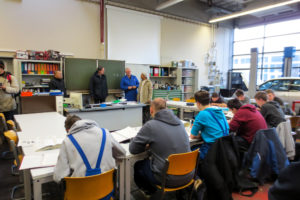
Implementation of the Priority Actions in Climate Change Sector
The Project’s overall objective is to achieve alignment of the North Macedonia’s legislation with the EU climate action legislation, and creation of an enabling environment for the successful implementation of the priority mitigation actions developed under the Long-term Strategy on Climate Action. The project’s specific objective is to

Supporting the Implementation of the Regional Waste Management Systems
The project aims are to support the North Macedonia in establishment of the regional waste management structure in the East and North-East Regions. To achieve its aims, the Project will be implemented through the following main activities: • Development and implementation of Regional Waste Management Public Awareness Program

Increasing Attractiveness, Inclusiveness and Relevance of VET and Adult Education
The overall objective is to improve skill matches of youth and adults in line with labour market needs by increasing access to quality vocational education, training and adult education. The project supports the Ministry of Education and Science of the Republic of Nort Macedonia and related national educational

Improvement of Legislation, Control and Awareness in Food Safety, Animal Health and Welfare in Ukraine
The project aims to support the implementation of the Association Agreement’s provisions between the EU and Ukraine concerning food safety, animal health, and welfare.

Skills Development and Innovation Support Project
The labour market demands quick responses to changes in the market and the demographic situation. Within this scope, the assignment aimed to provide technical assistance to the Government of Macedonia and the Ministry of Education and Science (MOES) to reform the 4-year Secondary Technical and Vocational Education and

Technical Assistance for Supporting the Solution of Economic and Social Integration Problems in Diyarbakır, Şanlıurfa, Gaziantep, and Erzurum, as Major In-Migrant Destinations
Rapid migration in major urban areas, namely Diyarbakır, Şanlıurfa, Gaziantep and Erzurum (DGES), have adverse impacts in Turkey. To reduce these unfavourable effects, EKOSEP aimed to support social integration and environment-related infrastructure problems due to migration in the selected provinces in a multi-actor manner. Furthermore, it aimed to

